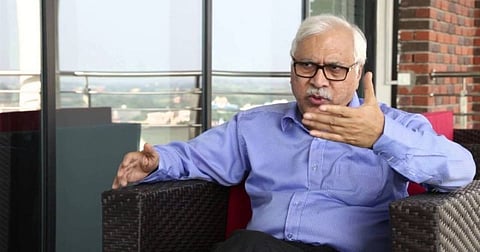
- Home
- Live Blog
- Breaking News
- Top Headlines
- Cities
- NE News
- Sentinel Media
- Sports
- Education
- Jobs

New Delhi: The Election Commission (EC) should treat social media like any other media and all rules that apply to the media during the model code of conduct should also apply to social media, former Chief Election Commissioner S.Y. Quraishi said on Friday.
Quraishi was speaking at an event where a group of former bureaucrats and organizations, like Common Cause, Free Internet Foundation, Association for Democratic Reforms and Free Software Movement of India, came together advocating regulations for digital media platforms, saying the threat posed by them to the integrity of elections had assumed “alarming proportions”.
Quraishi said that even beyond the elections, the disastrous consequences potential of the social media was quite significant.
“We have seen how rumours floating in the social media can cause havoc on law and order situation, security, and communal and caste strife. Therefore, we have to find some solution,” he said.
He added while a few years ago, everyone would be up in arms against any attempt to regulate social media, now even the Internet companies had come on board.
“Initially, there used to hue and cry saying the Election Commission is threatening free speech. But free speech does not give freedom to dis-inform, misinform, provoke, incite and create riots in the country,” the former CEC said.
He said as far as the EC was concerned, social media was also media and whatever applied to media should also apply to it.
“So, first you have to account for every penny spent on any media including social media. Second, you are accountable for the content that goes in any media including all political campaigns, speeches, advertisements... Every campaign material has to be pre-approved by the EC. Therefore, social media content should also be pre-approved,” he said.
Representing Common Cause, retired IAS officer Krishna Kant Jaswal said the general elections of 2014 gave clear indications of the way things could go wrong and how the social media could influence the outcome of elections at a time when use of smartphone was not even as widespread as today and when apps like WhatsApp did not have much traction.
“It is estimated that social media had a decisive role in about 116 parliamentary constituencies at that time. Nowadays, when the number of smartphones has doubled and number of WhatsApp users has gone up by more than five times, potential of mischief through misuse of social media platforms is mind-boggling,” he said.
Jaswal added that the group had earlier met the EC and submitted its recommendations and that it was assured that appropriate steps would be taken by the poll panel. But the progress was stalled “under the new dispensation”, with not much done except the voluntary code of ethics adopted by digital companies and mediated by the Internet and Mobile Association of India.
“It is a case of too little, too late. We welcome it as a good beginning but it leaves too much to be desired as it is not legally binding on the Internet companies,” he said.
Apar Gupta from Internet Freedom Foundation said there was need for the EC to monitor the online spending of political parties for election campaigns and not just the spending by candidates.
He added that the political parties should also disclose their official handles in all major social media platforms. (IANS)
Also Read: Top Headlines